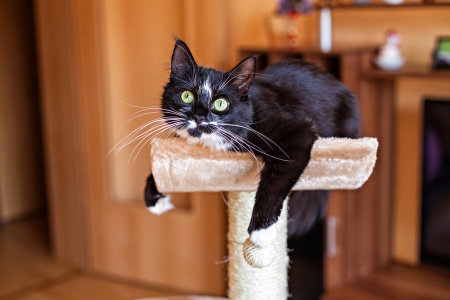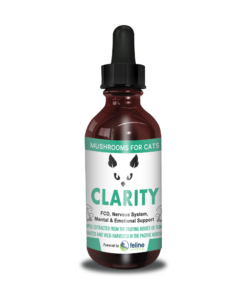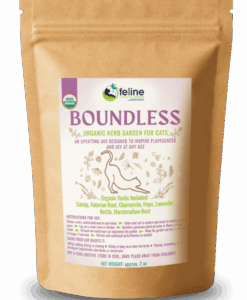Pancreatitis in cats is unfortunately becoming a increasingly common issue. The pancreas is a vital organ that, when taxed or injured, can become inflamed. Inflammation will cause it to malfunction. In fact, the definition of pancreatitis is “inflammation of the pancreas”.
The pancreas has two vital functions in the body: Producing insulin to regulate glucose levels and creating digestive enzymes to break down food.
Pancreatitis in cats seems to be more common in cats 10 years and older. While there isn’t a universal answer as to why cats get pancreatitis, there’s plenty of evidence pointing to processed foods. Cats have no requirement for carbohydrates in their diet, yet the average kibble food contains 35%-80% of carbohydrates. Carbohydrates can spike our cat’s insulin levels, which the pancreas then has to struggle to regulate.
Like carbs, a high-fat diet will cause the pancreas go into overdrive. Some of the enzymes it produces are for digesting fats. Low-quality foods and treats can be filled with fats.
So, it’s easy to see how 10+ years of eating a high carbohydrate diet would greatly tax the pancreas. Also, ALL processed foods are missing the digestive enzymes needed for overall vitality of life, so feeding this type of diet will cause the pancreas to work extra hard to create the enzymes needed.
Symptoms of Pancreatitis in Cats
The most common symptoms of pancreatitis in cats are lethargy and loss of appetite. More severe symptoms are vomiting and stomach pains and fever – but these symptoms are rare.
Overweight, obese cats, or cats with a high-fat diet are at high-risk for developing pancreatitis (and other problems), so pay attention.
Cat’s rarely come to us to tell us they are uncomfortable or ill. Their instincts make them very stoic, so these symptoms are often overlooked. This makes it very important to pay attention to their routine and behavior and have them checked by a vet if you notice unusual changes.
What to do for Pancreatitis in Cats?
If your cat is diagnosed with pancreatitis, it must be treated medically by your vet immediately. Once your cat has recovered, the chances of a reoccurring episode increase greatly. To lessen those chances and help your kitty hopefully avoid another episode, we highly recommend that you add a quality source of digestive enzymes into their daily meals. By adding digestive enzymes into their food, you will be reducing the stress on the pancreas which will help reduce the chance of a reoccurrence of pancreatitis.
What is a Good Diet for Pancreatitis in Cats?
In researching this disease for our customers, we spoke with the owner of Fetching Foods, a raw pet food company in our hometown of Las Vegas. Fetching Foods was born out of a passion for pet nutrition. One thing Troy (the owner) does is makes specialty diets for customers to help address specific issues. When we told him that we wanted to help some of you formulate a recipe to specifically manage pancreatitis in cats, he offered his assistance. We know that cats with pancreatitis need a low fat diet, but is that all? Here’s what Troy said:
“Once a cat gets pancreatitis it’ll be much more susceptible to, and more easily reacquire the disease. Dietary precautions will need to be taken for the life of the cat. Otherwise the kitty could end up with a fatal condition.”
“Once stricken a cat needs food that’s easy on their digestive system. That means high-quality protein, with less than 10% fat and 4% fiber. Use a novel protein as insurance against re-triggering the disease. Novel is something the cat has never consumed before, like Cornish hen, quail, pheasant, or buffalo. Most raw diets are +90% digestible. No kibble (dry food) has anywhere near that kind of digestibility rating. And lastly, dehydration plays a role. Feeding a raw diet which is naturally moisture-rich is another thing you can do to help prevent reoccurrences.”
You can contact Troy at Fetching Foods by clicking here. He doesn’t charge for dietary consultations in addition to making food formulated for your cat’s pancreatic needs. He’ll make it and ship it to your door. If you’d prefer to put it together yourself, which he says is the best way to feed your cat, he’ll help you with the recipe!
Liquid Digestive Enzymes for Cats





Recent Comments